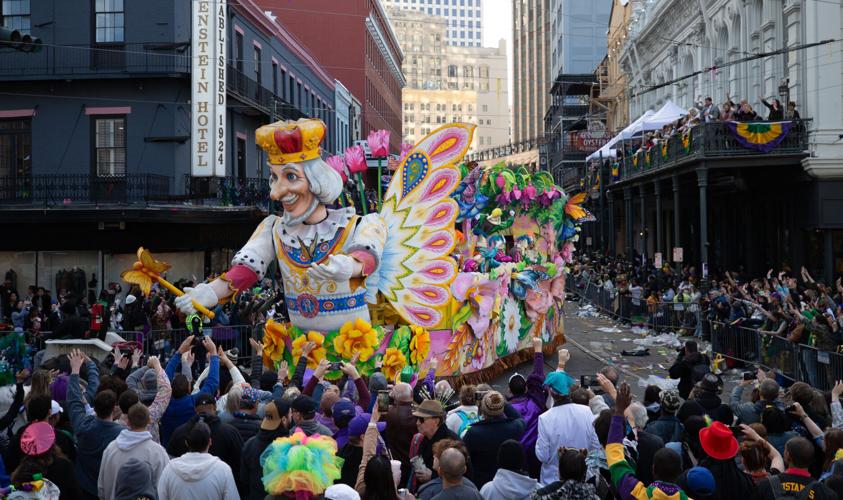Mardi Gras was a big success this year, krewe captains agreed Thursday during a meeting to assess the highs and lows of the 2024 Carnival season.
Maybe too big.
Very long parades that sometimes run late are straining city services, the Mayor's Mardi Gras Advisory Committee was told.
The reasons have to do with the booming popularity of New Orleans' signature celebration coupled with a sagging population.
Advisory council co-chair James Reiss III pointed out that “the demand to ride in a parade and participate in the walking krewes has gotten to an all-time high level.” But, he said, with a decline in population and other factors, the city hasn’t been able to keep pace with the celebration.
“We’re supporting a bigger Mardi Gras than ever with city services that have become a lot smaller,” he said.
In recent years, the majority of Carnival parades have been consolidated on St. Charles Avenue, often back to back, causing huge crowds to congregate on the route and processions to runlate.
In the days after Mardi Gras, the New Orleans Police Department reported that the Zulu parade finished 90 minutes later than it did the previous year, and the Rex parade was 75 minutes later. Road construction on Orleans Avenue and large crowds caused Zulu’s slow pace, according to NOPD.
But the larger issue at the heart of the discussion was simply that Carnival seems to be outgrowing New Orleans.
Barry Kern, president and CEO of float-builders Kern Studios, told krewe captains that he believes Carnival is twice as big as it was before Hurricane Katrina.
On certain popular days during the season, Reiss said, multiple parades run throughout the day and long into the night. The late nights, he said, tax the city’s first responders and students who march in the bands.
One solution, Reiss proposed, is that the city more stringently enforce the rule meant to prevent parades from stopping more than three times for toasts. Tractor drivers, he said, are known to accept tips to pause along the route, which causes gaps in the processions.

The notorious float-eating oak tree at the corner of Jefferson Avenue and Magazine Street is checked out by City of New Orleans pre-parade surveyors, using a pole on the front of a truck to confirm that Mardi Gras floats will clear all the distribution and communication lines and tree limbs along the parade route for Mardi Gras 2024. (Photo by Chris Granger, The Times-Picayune)
Float-eating trees
There are other reasons for delays. Kern pointed out that a streamer cannon shot during the Thoth parade apparently shorted out a transformer. The emergency restoration of the power grid, he said, delayed the Bacchus parade by an hour.
And the city’s famous float-eating trees can always be counted on to cause delays, Reiss said. The Rex parade, he joked, hits the same tree on St. Charles Avenue every year. And other parades have gotten snagged on a particularly treacherous oak at the turn from Jefferson Avenue onto Magazine Street during the past two years, causing long breaks. A relatively new median installed on Jefferson Avenue is apparently tightening the turn.
The krewe captains kicked around ideas for solving the problem of tree hazards, such as stationing authorities at the site of troublesome trees, or painting guidelines on the street to help tractor drivers avoid running into them.
Kern told the committee that technology may help keep the parades rolling more efficiently in the future. He said next year tracking devices will be added to every float in his fleet to help monitor the progress of the processions. If a float stops, he said, “we’re going to know instantly that there’s a problem.”

The Krewe of Cleopatra parades through New Orleans on Friday, February 2, 2024. (Photo by Chris Granger, The Times-Picayune)
The Mayor's Mardi Gras Advisory Council is tasked with advising Mayor LaToya Cantrell's administration on Carnival matters.
After all, Carnival isn’t just a party. With an estimated $900 million economic impact, it’s a major industry.
Another committee has recently been appointed to advise the City Council on possible changes to the laws governing the annual celebration. That panel meets for the first time at noon on April 10 in the council chambers.
Speeding up parades
Finally, Reiss suggested that taking steps to reduce the duration of parades and multi-parade days could have a positive effect on the ultimate condition of paradegoers.
“We all know everybody’s out there drinking and having a good time,” he said. “But it’s one thing to be out there drinking for four hours and it’s another to be out there drinking for 13 hours. It’s like being in college at a football game. It does not end well.”
The 2025 New Orleans Carnival season starts on Saturday, Jan. 6, and concludes on Mardi Gras, Tuesday, March 4.
Every year you say to yourself: “One day, I’m going to be in a Mardi Gras parade.” But you’re not sure exactly how to do it. Well, in some cas…
'Throw me somethin’ mister' has long been a Carnival-time mantra in New Orleans, as parade-goers vie for glinting plastic necklaces tossed fro…
There was a disturbance in the Force when the leaders of the Intergalactic Krewe of Chewbacchus realized their 2025 parade would fall on the n…










